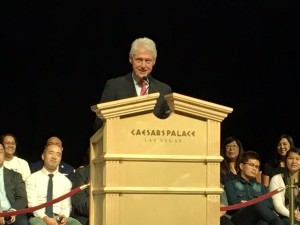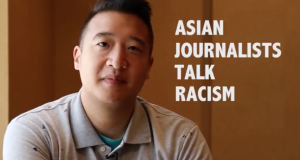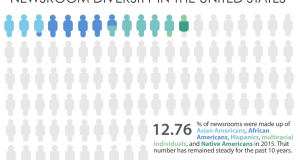Trying to swat away complaints that Hillary Clinton is not trustworthy, former president Bill Clinton told a group of Asian Americans in Las Vegas Friday that only his wife could be trusted to ensure that “you and everyone else who lives here can feel at home in America.”

Former President Bill Clinton campaigns for his wife Hillary at AAJA and APIAVote’s town hall in Las Vegas. (Photo taken by Zara Zhang)
Clinton’s comments came at a town hall meeting in Las Vegas that invited presidential candidates to address a large gathering of Asian Americans, sponsored by the Asian American Journalists Association and APIAVote, a nonpartisan organization dedicated to encouraging more Asian Americans to vote.
A representative of Donald Trump’s campaign also spoke, as did the nominees for the Libertarian party, former New Mexico Gov. Gary Johnson, and Green Party nominee Jill Stein. All four spoke about why Asian Americans deserve their support.
Bill Clinton faced a pointed question from an audience member on why voters should trust Hillary Clinton, given criticism of her response to the controversy over her emails. Clinton acknowledged that her use of private email was a mistake, but said the issue was overblown.
“This is not a cause for distrust,” Clinton said, arguing that if it was a major problem, his wife would not have received many endorsements from national security experts who worked in both Democratic and Republican administrations.
Instead, he stressed his wife’s commitment to immigration reform and how her platform is friendly to minorities. He said his wife favors automatically giving green cards to foreigners coming to the United States for masters and doctorate degrees.
“You want a president like Hillary Clinton who sees you as part and parcel of the American quilt of diversity,” he said. “She’s the only person running left that you can trust.”
Clinton said Republicans once said complimentary things about his wife before she started running for president. “Were they lying then before she started running for president?” he asked. “Her adversaries are very good at doing reverse plastic surgery.”
Trump’s representative, Utah Atty. Gen. Sean Reyes, a Republican who has Filipino roots, said he wanted to address a controversy that flared when Trump labeled the Philippines and other countries as “terrorist nations” and said refugees from those countries should not be allowed into the United States. Reyes said Trump welcomes law-abiding Filipinos to enter the United States.
Reyes, who was introduced as the highest-ranking Filipino American in elected office in the United States, also campaigned on lowering taxes and opposing affirmative action, which he said hurts Asian Americans.
On social media, many attendees expressed frustration that Reyes only delivered superficial content during much of his stage time: jokes about Asians (“clap if you think karaoke should be made an Olympic sport”), stories about his personal life, and a rap inspired by his idol Muhammad Ali.
Hey @seanreyesag: We don’t wanna hear your life story. Tell us why #AAPIs should vote for @realDonaldTrump #powerup pic.twitter.com/m373UJfUCn
— jozjozjoz (@jozjozjoz) August 13, 2016
Going on 10 minutes of @seanreyesag. Nothing of substance about @realDonaldTrump. #powerup #AAJA16 — Doris N. Truong (@DorisTruong) August 13, 2016
Both the Libertarian Party and Green Party nominees spoke of how important it was for voters to vote their conscience.
Johnson, the Libertarian nominee, talked about how building a wall between the United States and Mexico would be “crazy” and his opposition to mass deportation. He also said the last time he took marijuana was three months ago, and how he always tells the truth.
He stumbled, however, from a question by Richard Lui, an MSNBC anchor when asked what “AAPI” stood for.
“Asian Pacific Islanders of America?” Johnson said.
“I’m gonna retire on one of those islands,” he added.
“Good guess,” Lui said, but Johnson was wrong: AAPI stands for Asian American Pacific Islander.
The reaction was unsympathetic in the audience.
holy crap. @GovGaryJohnson didn’t know what AAPI stands for. #PowerUp #aaja16
— Yvonne Leow (@YvonneLeow) August 12, 2016
Stein, the Green Party nominee, presented herself as the natural home for supporters of Bernie Sanders, because, she said, “the Democratic Party sabotaged Bernie Sanders.”
She called herself the “one candidate that doesn’t take money from corporations, lobbyists and super PACs.” She also promoted clean renewable energy, and called for an end to wars that she said both Democrats and Republicans support. She also said “it’s time” for an Asian American Supreme Court justice.
“Now you’re just pandering,” Lui replied.
The event also featured Asian Americans in elected office, including Rep. Judy Chu (D-Calif.), the first Chinese American woman elected to the U.S. Congress who also serves as chair of the Congressional Asian Pacific American Caucus. Speakers celebrated the AAPI community’s journey from a group subject to systemic discrimination to a group able to make its voices heard and swing elections.
“We have come from being marginalized to being on the margin of victory,” Chu said.
Some people objected to how some audience members were shooed away from the microphones after Bill Clinton was asked a single question, about free trade, even though the former president urged that people be allowed to ask more questions. “I Gotta Feeling” by The Black Eyed Peas played over Clinton’s pleas, similar to cut off songs for long-winded speakers at award shows.
But a second question was shouted from the audience floor, asking about why voters should trust Hillary Clinton and he was able to respond. Some audience members said the forum should have allowed for more questions of Bill Clinton—especially with so many journalists in attendance.
@tihuachang is the definition of a true journalist. After @billclinton took only 1 question at “forum” … 1/2 #AAJA16 — CeFaan Kim (@CeFaanKim) August 12, 2016
@tihuachang forced music to be cut off and asked a question to pres. To @billclinton credit he stood there and answered it. 2/2 #AAJA16
— CeFaan Kim (@CeFaanKim) August 12, 2016
 VOICES Publishing from the AAJA National Convention
VOICES Publishing from the AAJA National Convention








